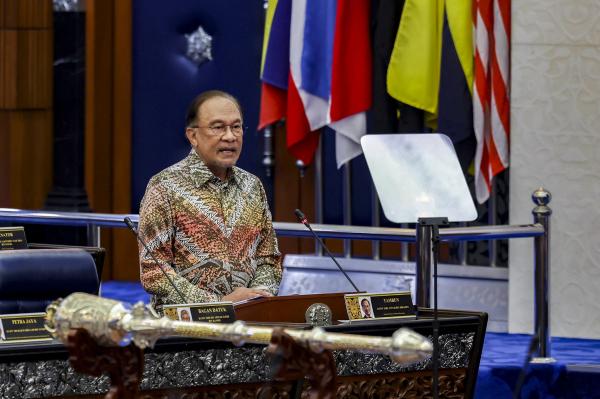KUALA LUMPUR, July 31 — The 13th Malaysia Plan (13MP), which aims to drive sustainable growth based on value creation across all sectors, involves RM611 billion in investments to ensure the success of the five-year plan, with RM430 billion being the government’s development allocation.
Prime Minister Datuk Seri Anwar Ibrahim said the 13MP also focuses on artificial intelligence and an emphasis on the 'Made by Malaysia' initiative to position the country as a globally competitive and high-income nation.
Anwar, who is also the Finance Minister, said the five-year roadmap, a continuation of the Madani Economy policy, aims to boost the country’s economic growth by raising the ceiling, improving the people’s standard of living, raising the floor, and strengthening service delivery towards best governance.
He was speaking during the tabling of the 13MP 2026-2030, themed 'Melakar Semula Pembangunan' in the Dewan Rakyat today.
“The national economy cannot rely solely on the production of basic materials in the agricultural, industrial and service sectors. We need to boost economic growth by shifting to value creation in all sectors of the economy.
“In pursuing national development efforts, we can no longer be fixated on narrow measures involving economic growth figures, for example,” Anwar said.
He noted that the Gross Domestic Product (GDP) growth and expansion will not mean anything if the shackles of hunger, injustice, and marginalisation still oppress the people’s freedom and right to live with dignity.
Malaysia’s GDP growth is projected to grow at a rate of 4.5 per cent to 5.5 per cent per year over a five-year period, led by domestic demand, especially private consumption and investment.
The country's gross exports are expected to increase by 5.8 per cent per year with wider trade opportunities. The services, manufacturing and construction sectors remain the main sources of growth contributed by the transition to an economy based on value creation.
Anwar said the Federal government’s fiscal deficit is expected to gradually decrease to below three per cent of GDP, while the government debt level will not exceed 60 per cent of GDP.
“The Gross National Income (GNI) per capita is targeted to increase to RM77,200 and is expected to exceed the threshold value of a high-income country,” he said.
Malaysia's labour market is expected to improve with the share of workers’ compensation to GDP reaching 40 per cent, and the unemployment rate is expected to reach full employment by 2030.
The average inflation rate is also expected to remain stable within the range of two per cent to three per cent per year.
Regarding the RM611 billion investment, Anwar said the government’s development allocation is estimated at RM430 billion.
Funding from government-linked companies (GLCs) and government-linked investment companies (GLICs) would amount to RM120 billion to support economic growth through domestic direct investment in strategic sectors.
“Support from the private sector, via the public-private partnership (PPP) method, stands at RM61 billion,” he said.
Of the RM430 billion allocation, more than half, or RM227 billion, will be channelled to the economic sector as the main pillar of the country’s growth.
Besides, the social sector is also given priority with RM133 billion allocated, with the education sector receiving RM67 billion, health (RM40 billion), security (RM51 billion) and administration (RM17 billion).
Regarding 'Made by Malaysia', the Prime Minister said Malaysia wants to emerge as the leading economy in Asia and be known for its own identity that upholds the cultural roots and wisdom of the East.
The nation aspires to emerge as a high-income country and be among the world's 30 major economies by 2030.
"This aspiration requires us to be determined to accelerate the transition to an economy based on value creation by fostering a culture of innovation," he said.
Malaysia needs to transform from being just a consumer society to a technology leader and producer of world-class 'Made by Malaysia' products and services.
Anwar added that Malaysia has set a clear direction to lead the Southeast Asian economy in artificial intelligence (AI), digital technology, and the renewable energy industry, with aspirations to emerge as an influential player on the global stage.
“The application of local technological innovations will be focused on to promote economic growth, especially in the development of strategic digital assets such as AI, data analytics and government digital systems,” he said.
Research, development, commercialisation, and innovation (RDCI) activities will also be intensified to improve products and services based on 'Made by Malaysia'.
— Bernama




